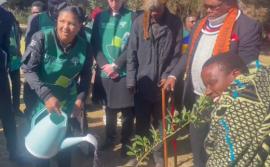Friday, August 22, 2025

The Deputy Minister of Forestry, Fisheries and the Environment, Bernice Swarts, has called on South Africans to plant trees to help reduce the impact of carbon emissions and restore natural ecosystems.
“I learnt that we are not doing enough to meet the tree planting targets. This is due to limited resources within the fiscus. There is a realisation now that we can do better through collaboration,” Swarts said on Thursday in Durban.
Addressing the South African Local Government Association (SALGA) National Urban
“While not a complete solution, reforestation and afforestation initiatives play a crucial role in mitigating climate change and helping communities adapt to its impacts,” she said.
Trees provide a range of benefits beyond carbon sequestration, including habitat for biodiversity, soil stabilisation, and water purification.
South Africa’s Constitution recognises that everyone has a right to an environment that is not harmful to human health and well-being, and to have the environment protected, for the benefit of present and future generations.
"Tree planting has been happening in South Africa for a number of years, this then led to the President of the Republic of South Africa, Cyril Ramaphosa, directing that the tree planting programme be escalated to Ten Million Trees over a period of five years starting from 2020/21.”
READ | Campaign to plant trees and help mitigate effects of climate change
The Deputy Minister challenged the nation to plant one million trees on 24 September 2025 as part of celebrations for Arbor Month.
“The target that is set is not only for the Department of Forestry, Fisheries and the Environment (DFFE), but it is a call for action to other role–players to assist in achieving the target. I am calling on all South Africans to plant one million trees.
“This initiative has been consulted with a number of stakeholders who have shown interest in planting the trees. It is also important to note that once the trees are planted, they need to be taken care of, hence we have identified safe space to do the planting,” Swarts said.
The safe spaces include human settlements, clinics, schools, and police stations.
“The idea is that these trees must be available when we come back to audit them. Furthermore, this initiative is structured such that citizens of the country start to appreciate the role that trees play in our daily lives. In terms of municipalities, the department is also assisting with [the] drafting of greening plans to ensure that all areas are greened appropriately,” she said.
The DFFE has noted with concern the increased pressures on natural forests, especially coastal forests due to urban development.
“Forests also play a crucial role in mitigating various natural disasters, acting as natural buffers against events like floods, landslides, and droughts. Deforestation, however, significantly weakens these protective functions, increasing disaster risks and impacts.
“Deforestation, the clearing of forests, also significantly undermines disaster risk management efforts. It is therefore important that urban planners, particularly in cities like Durban / eThekwini, [to] take into account the need to safeguard the integrity of the environment,” the Deputy Minister said. -SAnews.gov.za
No comments:
Post a Comment